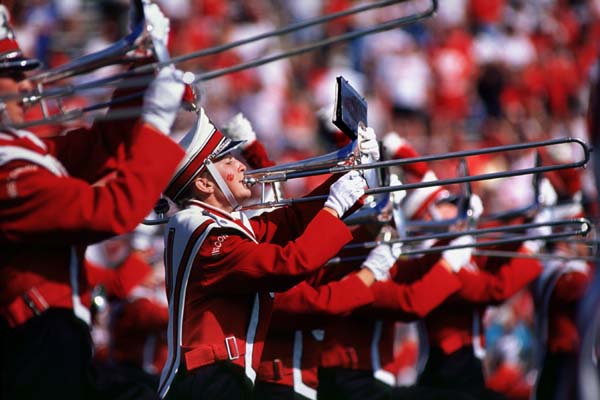Five Tips for Marching Band Season
Editor’s Note: This guest post was written by Wes Lebo. Wes is a professional trombonist and clinician in the Southeast region. Based in Memphis, Tennessee, Wes plays Second Trombone in the Memphis Symphony Orchestra and has also performed as the Assistant Principal/Second Trombone of the Spartanburg (SC) Philharmonic. He is in high demand throughout the South and has performed with many orchestras and chamber groups. In addition to performing, he has a passion for teaching and sharing his love of music with anyone and everyone. His dedication and devotion to music can be quite contagious! If you would like to know more about Wes and would like to contact him, check out his website, www.weslebo.com.
—————————
Every year in August, I experience the mass exodus of my teaching studio to the seemingly all-consuming schedule of marching band. I lose the majority of my students to the busy schedules of band-camps, competitions, football activities, etc. When they return, I have found that we have to review much of what was taught previously, as without the weekly reminder regarding technique, posture, and tone concepts they have slipped unknowingly back into bad habits. Recently, I was thinking about this unfortunate seasonal laps. It occurred to me that the problem is not so much the marching season, though to be sure, I have my reservations about the culture it has created. As a professional musician, I have found myself in less than ideal engagements that demand my time and energy in ways that require a focused, and efficient approach to daily improvement on the horn. The similarity in terms of the schedule demands and the tendency to let some important things slide (pun intended) to what a student may face during marching season caused me to sympathize with the issue, and think about how one can not only survive these less than ideal circumstances but even thrive in them. So here are some tips on how to survive, and even thrive musically during marching band season.
1. Don’t quit private lesson instruction for the duration of marching season. I understand that it is a very busy time, but quitting private lessons for that time does more to hinder the progress on your instrument, then any benefits there may be to being involved with your marching band program. If you are a serious student who is considering majoring in music in college, you need to continue private lessons year-round in order to set yourself up for the best opportunities for success in college. It is understandable to take a week or two off for family vacations etc., but if you find that you are taking more time off than that, you are doing yourself a disservice. Keep the private lessons going all year long and you will become one of the best players in your band, region, and possibly state.
2. Always do your daily warm-up and routine. Your teacher should have you set up on the daily routine of some kind. Never sacrifice your routine during marching season. If you need to get up earlier to do your routine, do so. If you need to buy a practice mute so that you can do your routine during hours that might disturb others, go buy one. And if you need a routine, email me at [email protected], or message me on Facebook and I will send you some routines that you can use.
3. Always do your routine mindfully. Don’t just go through the motions. Always focus on producing the most beautiful sound that you can imagine. Always listen for good intonation. Do your routine with a drone pitch and a metronome.
4. Every time you play in band or in marching band, be as mindful as possible. Once you learn your show it’s easy to go through the motions and just pop out of performance from memory. Try not to do this. Once you have the show learned, begin to focus on other aspects of your plane. Ask yourself questions such as “am I holding the slide correctly?” You can practice a variety of techniques such as air attacks at all volume levels, relaxed, accurate slide movement, and sustained smooth air support. You can also use the opportunity to develop your ability to listen to not just your section or the major melodic activity being played, but to other sections in the band that is playing a more supportive role. Try focusing on one section at a time and see if you can hear what they’re doing all the way through the program. Even try learning their part by ear so that later you can hum or sing it, or even played it on your instrument. Never just “phone in” a performance. Always find ways to be actively engaged in every playing situation.
5. When you are playing for an audience, always try to bring them into your performance. Always be as musical as possible. Sustain your air as long as possible. Imagine your sound at loud volumes to be actually reaching out and touching the person sitting the furthest away. And the softest volumes have the soft intensity that allows the person sitting the furthest away to hear you, yet at the same time forces everyone to lean forward in their seats so that they can hear your beautiful, incredibly soft tone. Music is communication. Always told the story you believe you have to tell. Tell it proudly. Tell it with conviction. And tell it every time you play your horn.
Last Updated July 31, 2019, at 10:29 am.



